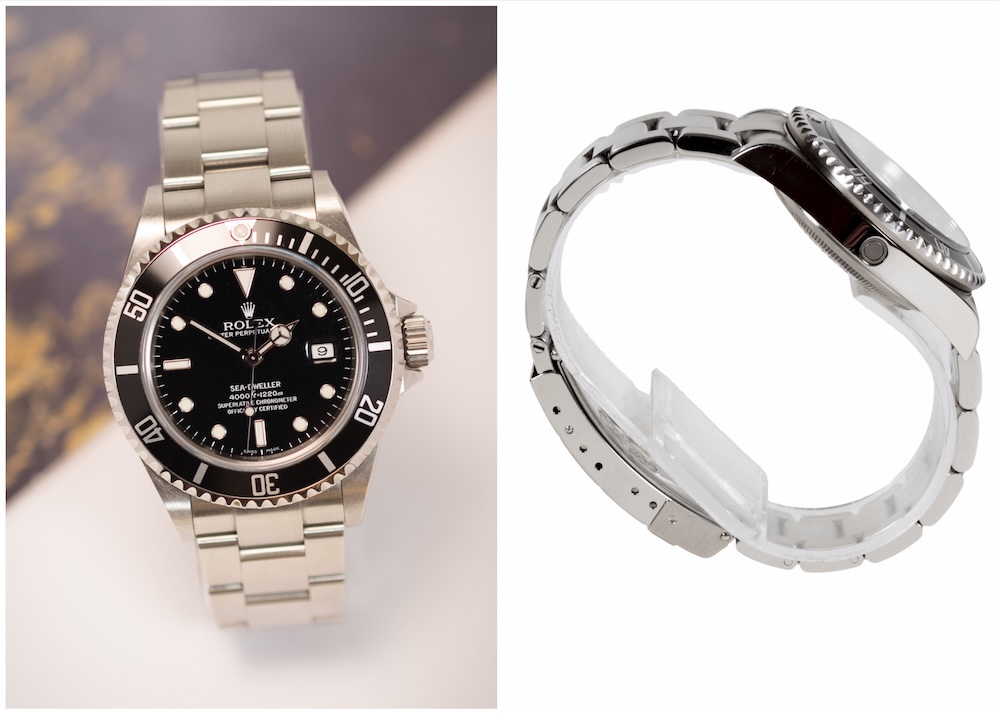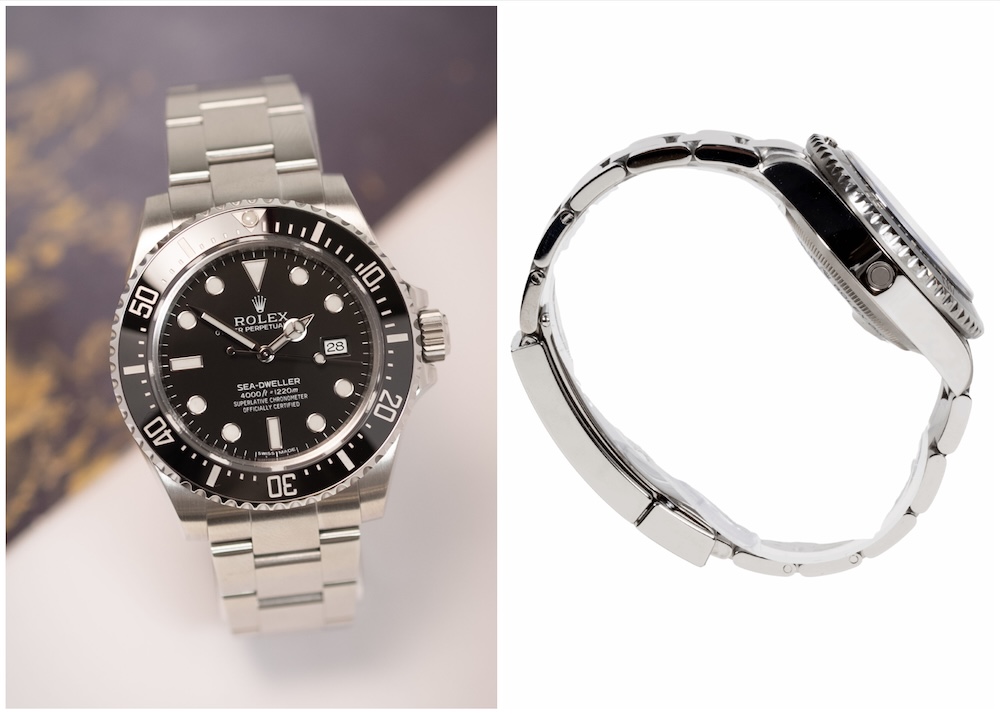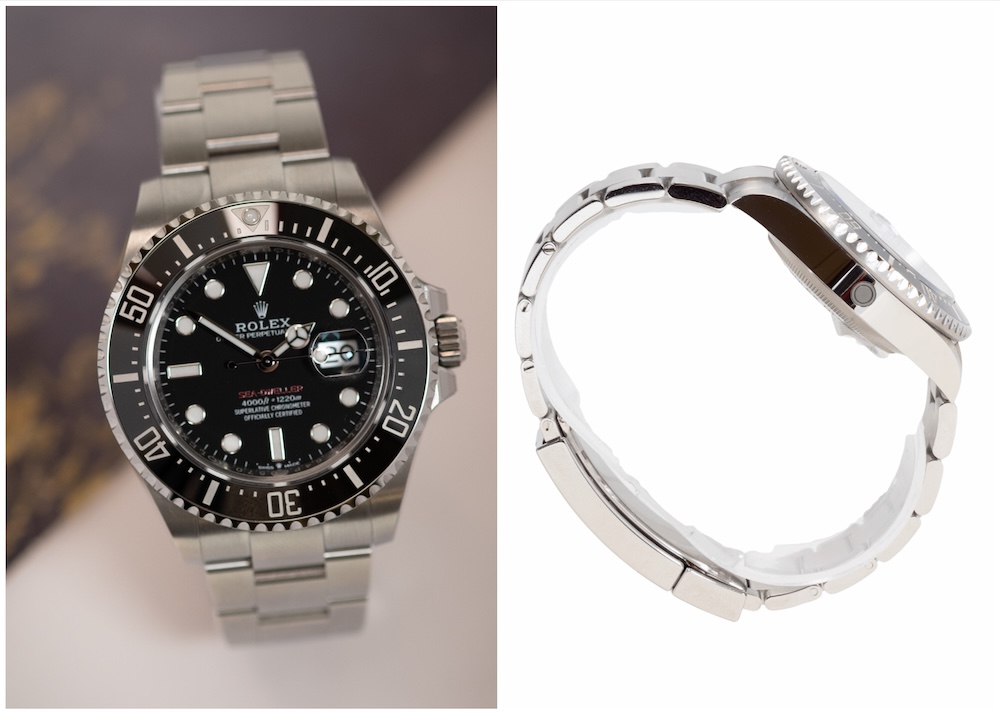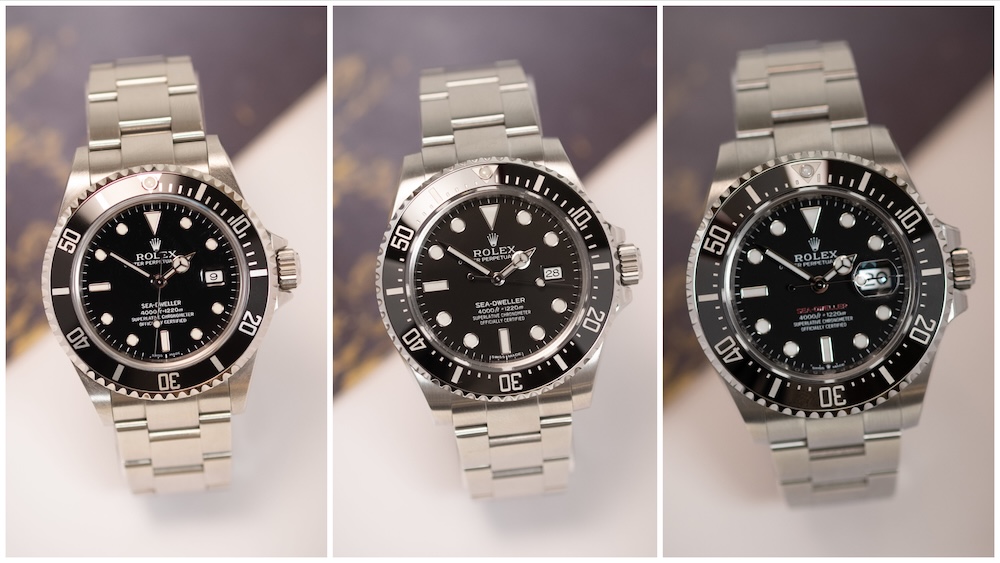Rolex Sea-Dweller Comparison: 16600 vs 116600 vs SD43
If you’re a fan of Rolex sport models, particularly the deep-diving professional pieces – you’re in for a treat. Today, we’re taking a closer look at three generations of the Rolex Sea-Dweller, one of the most capable and historically significant dive watches ever built.
To understand how we got here, we need to briefly revisit the origins of the Sea-Dweller and the purpose behind its creation.
The History of the Rolex Sea-Dweller
Rolex released the Submariner in 1953, a watch that quickly became the benchmark for recreational and professional diving. But by the late 1960s, saturation diving was evolving rapidly, largely driven by companies like COMEX, who worked closely with Rolex on solving a critical problem: helium buildup inside watch cases during deep-sea decompression.
The solution? A new watch, purpose-built for serious commercial divers with greater depth resistance, a thicker crystal, and a helium escape valve.
Thus, in 1967, the prototype Rolex Sea-Dweller was born.
Since then, four broad generations have defined the Sea-Dweller family:
- 1665 ‘Double Red’ (1969 – 1977) and 1665 ‘Great White’ (1977 – 1981)
- 1666 ‘Triple Six’ (1981 -1989) and 16600 (1989 – 2011)
- 116600 Ceramic (SD4000) (2014 – 2017)
- 126600 SD43 50th Anniversary (2017 – present)
Today, we have three of these modern references in hand: 16600, 116600, and the SD43 (126600) – each representing a major chapter in the Sea-Dweller’s evolution.
Let’s break down what makes each one unique.
Rolex Sea-Dweller 16600 – The Classic Professional Diver (1989-2011)

The 16600 is the longest-running Sea-Dweller reference ever produced, spanning over 22 years. For many purists, this is the last truly classic Sea-Dweller, retaining much of the vintage DNA from the earlier 1665 and 1666 models.
Key Features:
-
40mm case with slim lugs
-
Aluminium bezel insert
-
No cyclops – Rolex could not yet guarantee the glued magnifier would withstand 4,000 ft/1,220m of pressure
-
Thicker case and crystal than the Submariner
-
Helium escape valve at 9 o’clock
-
Calibre 3135 movement
-
4,000 ft water resistance
While it shares the same footprint as a Submariner Date, it wears considerably more substantially due to the taller crystal and deep case, necessary for the increased depth rating.
Why collectors love it:
It’s the last Sea-Dweller that remains truly “old-school Rolex”: slim, tool-like, understated, and without a cyclops. The perfect mix of vintage charm and modern reliability.
Rolex Sea-Dweller 116600 Ceramic (SD4000) – The Short-Lived Modern Classic (2014-2017)

After a three year hiatus with no Sea Dweller in the lineup, in 2014 Rolex introduced its first ceramic-bezelled Sea-Dweller, the 116600 sometimes known as the SD4000. With a production run of just under three years, it remains one of the shortest-lived Rolex sport references of all time.
Key Features:
-
40mm case, but with much wider “maxi” lugs
-
Cerachrom ceramic bezel (scratch-resistant, corrosion-resistant)
-
Updated Glidelock clasp & solid-link bracelet
-
Thicker lugs and overall chunkier proportions
-
No cyclops, still following original Sea-Dweller tradition
-
Helium escape valve retained
-
Calibre 3135 movement
-
4,000 ft water resistance
What’s interesting is that, despite sharing the same 40mm diameter as the 16600, it wears significantly larger due to the wide lugs, ceramic bezel design, and thicker case architecture.
Why it didn’t sell at the time:
Simply put – Rolex buyers weren’t ready for it.
The Submariner had just moved to its ‘Super Case’ proportions, and many collectors found the new aesthetic too bulky. The Sea-Dweller SD4000 pushed these proportions even further.
As a result, ADs struggled to sell them. Ironically, this scarcity has made the 116600 something of a cult favourite today.
Rolex Sea-Dweller SD43 (126600) – The 50th Anniversary Game Changer (2017-present)

Released in 2017 to celebrate the 50th anniversary of the first Sea-Dweller prototype, the SD43 (reference 126600) introduced the biggest shift in the model’s history.
Key Features:
-
43mm case – the largest Sea-Dweller ever made
-
Cyclops over the date (a first for the Sea-Dweller line)
-
Red “Sea-Dweller” text – a nod to the single line of red text on the original prototype
-
New-generation movement, Calibre 3235
-
70-hour power reserve
-
Improved shock & magnetic resistance
-
-
Broader bracelet and beefier clasp
-
Deeper case and tall crystal profile
-
Ceramic bezel with platinum-filled numerals
-
4,000 ft/1,220m water resistance
-
Helium escape valve still present
The SD43 represents Rolex’s modern design language at its most refined: larger proportions, bigger wrist presence, and the first Sea-Dweller with a cyclops after Rolex finally perfected the process of bonding the magnifier securely enough for saturation diving.
Why it’s so popular today:
The SD43 strikes a perfect balance between:
-
the modern robustness collectors now expect
-
the heritage cues (like the red text) that collectors adore
For many, it is the most impressive modern Sea-Dweller ever made.
Three Watches, Three Eras – The Evolution of a Deep-Sea Icon

Looking at these three references side by side, you can clearly see how Rolex has evolved the Sea-Dweller over the decades:
16600 – The Classic Tool Watch
Understated, traditional proportions, aluminium bezel, no cyclops. A pure dive instrument.
116600 – The Modernised Traditionalist
Ceramic bezel, improved engineering, but still follows the original Sea-Dweller recipe. Short production run makes it highly collectible today.
SD43 – The Modern Powerhouse
Larger, more engineered, more advanced, and not afraid to break old Sea-Dweller rules. The modern big-wrist dive watch.
Each one represents a distinct moment in Rolex’s development, from the brand’s traditional professional tool-watch era to its contemporary heavy-engineering, high-luxury phase.
Which Rolex Sea-Dweller Should You Choose?
That depends entirely on what you value:
-
Love classic Rolex proportions and no-nonsense tool aesthetics?
→ Go for the 16600. -
Want modern tech with old-school Sea-Dweller DNA – plus rarity?
→ The 116600 is your watch. -
Prefer modern size, presence and cutting-edge engineering?
→ The SD43 is hard to beat.
At the time of writing, all three models are in stock here at Oakleigh Watches, each in immaculate condition. If you’re considering a Sea-Dweller, this is a rare opportunity to compare all three generations side-by-side.
Join the Conversation
Which Sea-Dweller do you prefer – the classic 16600, the short-run 116600, or the modern SD43?
We’d love to hear your thoughts, especially on the SD43 and its departure from traditional Sea-Dweller sizing.
Head over to our YouTube channel to watch our Sea-Dweller comparison video, watch here.



